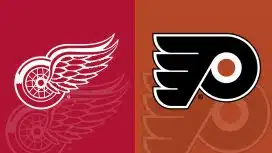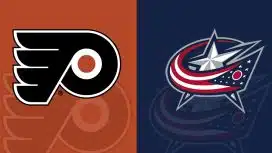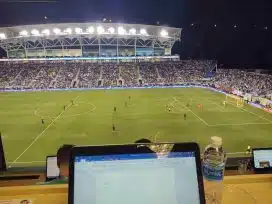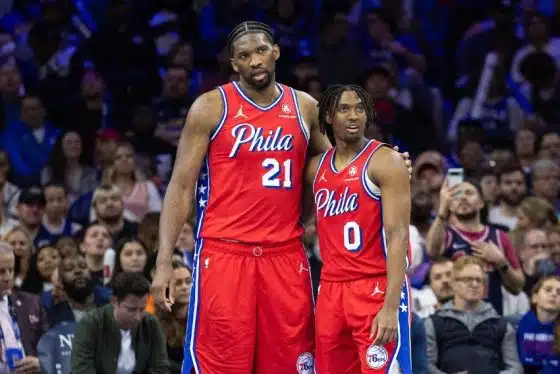Uncategorized
Examining The Flyers’ Playoff Potential
The Flyers currently sit in 4th place in the Metropolitan Division with 73 points and are in possession of the 2nd and final wild card needed to qualify for the Eastern Conference playoffs. However, they are only one point behind the New York Rangers for 2nd place in the Metro and have a game in hand. They have 17 games left in the season to make their playoff push, but the schedule makers have given the Flyers an extremely unfavorable slate of games left to qualify for the postseason. How unfavorable? Let’s take a look:
March 15: vs. Pittsburgh (92 points, 1st in Metropolitan Division, 1st in Eastern Conference)
March 16: at Pittsburgh (92 points, 1st in Metropolitan Division, 1st in Eastern Conference)
March 18: vs. Chicago (90 points, 3rd in Central Division, 5th in Western Conference)
March 20: vs. Dallas (74 points, 5th in Central Division, 8th in Western Conference)
March 22: vs. St. Louis (95 points, 1st in Central Division, 1st in Western Conference)
March 24: vs. Los Angeles (82 points, 3rd in Pacific Division, 6th in Western Conference)
March 26: at New York Rangers (74 points, 2nd in Metropolitan Division, 6th in Eastern Conference)
March 28: vs. Toronto (80 points, 2nd in Atlantic Division, 3rd in Eastern Conference)
March 30: vs. Boston (91 points, 1st in Atlantic Division, 2nd in Eastern Conference)
April 1: at St. Louis (95 points, 1st in Central Division, 1st in Western Conference)
April 3: vs. Columbus (73 points, 3rd in Metropolitan Division, 7th in Eastern Conference)
April 5: at Boston (91 points, 1st in Atlantic Division, 2nd in Eastern Conference)
April 6: vs. Buffalo (46 points, 8th in Atlantic Division, 16th in Eastern Conference)
April 8: at Florida (55 points, 7th in Atlantic Division, 15th in Eastern Conference)
April 10: at Tampa Bay (75 points, 4th in Atlantic Division, 5th in Eastern Conference)
April 12: at Pittsburgh (92 points, 1st in Metropolitan Division, 1st in Eastern Conference)
April 13: vs. Carolina (65 points, 7th in Metropolitan Division, 13th in Eastern Conference)
Yikes. The Flyers have 12 consecutive games against current playoff teams and 14 of their final 17 come against playoff teams overall. So we’ve established that the Flyers are playing good teams. But how have they fared against these types of teams so far?
|
Type of Team |
Games Played vs. Type |
Points Earned/Possible |
Point Percentage |
|
Western Conference playoff teams |
11 (5 remaining) |
8/22 (4-7-0) |
36.36% |
|
Eastern Conference playoff teams |
16 (9 remaining) |
12/32 (6-10-0) |
37.50% |
|
Eastern Conference lottery teams |
26 (3 remaining) |
34/52 (15-7-4) |
65.38% |
The Flyers have picked up 56.15% of their possible points this season, for a reference point. So we see the Flyers doing fairly well against the teams they should be picking up points against: they’re picking up points against the bad teams in the Eastern Conference (and the Western Conference, too-they’re 8-2-2 in games against the 7 non-playoff teams in the West for a 75% point percentage, but I didn’t include them on the chart since they have no more games remaining against these teams.), but they’re struggling against the good teams on their schedule. Unfortunately, they pretty much only have good teams on their schedule. They have 9 remaining games against Eastern Conference playoff teams (including 5 against the East’s top 2 seeds) and 5 against Western Conference playoff teams (including 2 against the best team in the NHL). That leaves only 3 games left against bad teams, all of whom are in the Eastern Conference.
At their current rates, the Flyers can be expected to pick up 3.6 points of the 10 possible remaining against the Western Conference playoff teams (let’s round up to 4), 6.75 of the possible 18 points remaining against the Eastern Conference playoff teams (let’s round up to 7), and 3.92 of the possible 6 points remaining against Eastern Conference lottery teams (let’s round up to 4). That would give the Flyers a total of 15 points out of the potential 34 remaining on their schedule, or a record of 7-9-1. 15 points would get them to 88 points and a record of 40-34-8, certainly not good enough to make it into the postseason. Sportsclubstats.com (seriously, check this out if you haven’t already-great stuff) has the Flyers with a 59.5% chance to make the postseason as of now, but says that if the Flyers finish with 88 points that likelihood drops to just 16%.
But maybe the Flyers have fared better against the specific teams left on their schedule than they have against the overall demographic on the schedule for the types of teams they have left to play. So I took a look, along with adding a few details about each game to refresh your memory:
Pittsburgh: 1-1, 3 games remaining. The Flyers lost 4-1 to the Penguins at home on October 17th to drop to 1-7 on the season in what was arguably the nadir of the 2013-2014 campaign. On November 13th, they came back and beat the Penguins 2-1 in Pittsburgh despite being outshot 31-21 behind Brayden Schenn’s 2 goals and Ray Emery’s 30 saves. Look for Emery to get his first start since February 8th when the Flyers go back to Pittsburgh on Sunday.
(pic via NYTimes.com)
Chicago: 0-1, 1 game remaining. After getting back to .500, the Flyers went on a 0-2-1 stretch that was capped off by a 7-2 loss to the Blackhawks in Chicago on December 11th. The Flyers actually outshot the Blackhawks 10-6 in the first period and led 1-0 on the strength of a Jakub Voracek power play goal, but the Flyers surrendered 5 goals in the 2nd period and the game quickly turned into a rout. Ray Emery surrendered 6 goals on 18 shots in his return to Chicago.
Dallas: 0-1, 1 game remaining. A 5-1 loss to Dallas on December 7th started the aforementioned 0-2-1 stretch. The Flyers took a 1-0 lead into the 2nd period on a late Andrej Meszaros goal, but Dallas came out flying in the 2nd period, scoring 4 goals and outshooting the Flyers 13-6. Tyler Seguin had a natural hat trick and an assist in the 2nd and rookie Valeri Nichushkin had a goal and 3 assists.
St. Louis: 0-0, 2 games remaining. The Flyers and Blues haven’t played yet, but the additions of Ryan Miller and Steve Ott at the trade deadline have strengthened an already formidable Blues squad.
Los Angeles: 1-0, 1 game remaining. On February 1st, in their first matchup against the Richards-Carter tandem since the two were traded in June 2011, the Flyers won 2-0 in LA despite being outshot by a whopping 35-13 margin. It was one of Steve Mason’s best performances of the season, and him, Wayne Simmonds, and Claude Giroux (a goal and assist for both) were the only reasons the Flyers were able to pull out a win.
New York Rangers: 2-1, 1 game remaining. On October 24th, the Flyers got their second win of the season against a Cam Talbot-led Rangers squad in a tough 2-1 game. Matt Read opened the scoring with an unassisted shorthanded goal in the first period before Brad Richards answered with a bad angle goal late in the period. Braydon Coburn scored the game-winner early in the 3rd period and the Flyers held on through some hairy moments, including a disallowed Rangers goal late in the 3rd. Mason made 30 saves in the win. On January 12th, the Rangers beat the Flyers 4-1 in a nationally televised game from Madison Square Garden. 3 Ranger goals in the first 10 minutes of the 1st period from Dan Carcillo, Rick Nash, and Derick Brassard spelled doom for the Flyers. Chris Kreider and Mark Streit traded power play goals later in the game. Finally, on March 1st the Flyers beat the Rangers 4-2 in a Saturday matinee at the Wells Fargo Center. Vincent Lecavalier and Sean Couturier tallied 1st period goals less than a minute apart, but the Blueshirts came back and scored twice in a lethargic second period for the Flyers to tie the game at 2. Less than 2 minutes later, however, Wayne Simmonds scored the eventual game-winning goal on the power play. Luke Schenn buried a rebound with just under 4 minutes left to seal the win for the Flyers.
Toronto: 0-1-1, 1 game remaining. The Flyers opened their season with a 3-1 home loss to the Maple Leafs on October 2nd. Brayden Schenn opened the scoring with a power-play goal late in a 1st period dominated by the Flyers, but a 2nd period goal from Phil Kessel knotted the score going into the 3rd. An early goal by Dave Bolland gave the Maple Leafs the lead and a late one sealed the win, despite the Leafs being outshot 32-25. On March 8th, the Flyers fell 4-3 in OT to the Leafs in Toronto. Jake Gardiner and Nazem Kadri scored in the first 4 minutes to put the Leafs up early, but a late 2nd period goal from Kimmo Timonen cut the deficit in half. Timonen struck again in the 3rd to tie the score, but Mason Raymond gave Toronto the lead with under 7 minutes to play. Shortly after Timonen rung his bid for a hat trick off the post, Braydon Coburn’s point shot with 2:32 remaining sent the game to overtime. After Mark Streit was caught up high in the zone and left Nicklas Grossmann alone down low, Joffrey Lupul converted on a 2-on-1 feed from Dion Phaneuf to give Toronto the extra point they deserved.
Boston: 0-1, 2 games remaining. In arguably their worst performance of the season, Boston annihilated the Flyers 6-1 on January 25th. Zdeno Chara and Jarome Iginla each scored goals in the first and third periods and Reilly Smith and Patrice Bergeron added goals in the middle stanza for the Bruins. Claude Giroux scored on the power play for the only Flyers goal. Steve Mason was pulled after allowing 4 goals on 19 shots.
Columbus: 1-2, 1 game remaining. On December 19th, the Flyers had arguably their wildest win of the season with a dramatic 5-4 comeback victory at the WFC. The Flyers outshot the Blue Jackets 14-4 in the 1st period but went into the intermission down 1-0 after a Cam Atkinson shorthanded goal. Columbus then extended their lead to 3-0 in a dominant second period that saw them outshoot the Flyers 18-9 on goals from Jack Skille and Nick Foligno. Jakub Voracek and Braydon Coburn scored a minute apart early in the 3rd to cut the lead to 3-2, but a Blake Comeau goal 3 minutes later figured to end the Flyers’ comeback bid. With the goalie pulled, Erik Gustafsson joined the rush and scored on a rebound to get the Flyers within a goal with less than 5 minutes left. 53 seconds later, Claude Giroux tucked in a loose puck in the crease to tie the game at 4. With 1:38 left to go, Giroux roofed a no-look backhand over Curtis McElhinney’s shoulder to give the Flyers a 5-4 win. The 2 goals for Giroux (to go along with his 2 assists) were his 99th and 100th career goals. 2 days later, the Blue Jackets took the back end of the home-and-home with a 6-3 win. Goals by Ryan Johansen and RJ Umberger gave Columbus a 2-0 lead, but goals 20 seconds apart late in the 2nd from Wayne Simmonds and Sean Couturier tied the game going into the 3rd period. Columbus outscored the Flyers 4 (David Savard, Boone Jenner, Johansen, Umberger) to 1 (Simmonds) in the 3rd to skate off with a win. Columbus beat the Flyers again 5-2 on January 23rd in Columbus. Jack Johnson gave Columbus a 1-0 lead after the 1st period, but 2nd period goals from Brayden Schenn and Vincent Lecavalier gave the Flyers a 2-1 lead. Derek MacKenzie and Matt Calvert answered for the Blue Jackets, however, and they went into the 3rd period with a 3-2 lead they wouldn’t relinquish. Brandon Dubinsky and Nathan Horton closed out the scoring.
Buffalo: 2-0, 1 game remaining. The Flyers beat the Sabres 4-1 on November 21st behind a dominant performance from the Downie-Couturier-Read line. A late Tyler Myers power play goal gave the Sabres a 1-0 lead entering the 2nd period. They would hold that lead for most of the period despite being dramatically outshot until 2 Matt Read goals from Downie and Couturier within 2 minutes late in the period gave the Flyers the lead. Vincent Lecavalier scored on the man advantage in the 3rd to extend the Flyers lead and Scott Hartnell added an empty-net goal. The 3rd line combined for 2 goals, 4 assists, and 11 shots on goal in the win. Ryan Miller made 42 saves in the loss. On January 14th, the Flyers won a surprisingly dramatic game 4-3 in Buffalo. Cody Hodgson scored in the 1st for Buffalo and Jakub Voracek scored in the 2nd for the Flyers to send the game to the 3rd tied at 1. Matt D’Agostini gave the Sabres a 2-1 lead early in the period, but Brayden Schenn and Scott Hartnell goals 2:25 apart gave the Flyers a 3-2 lead with 4:07 left. Less than a minute later, however, Tyler Ennis tied the game at 3. Vincent Lecavalier won the game on a slapshot that beat Jhonas Enroth with 15 seconds remaining. The Flyers outshot the Sabres 33-19 and were well deserving of the regulation win.
(pic via sabres.nhl.com)
Florida: 1-1, 1 game remaining. The Flyers got their first win of the season in the first game of the Craig Berube era on October 8th against the Panthers by a 2-1 score. Brayden Schenn and Braydon Coburn scored 2 fairly lucky goals early in the 1st period on an injured Tim Thomas. Jacob Markstrom entered in relief and shut the Flyers down the rest of the way, but Steve Mason’s 33 saves helped the Flyers to the win. He allowed a goal late in the 2nd to Brad Boyes, but was lights-out the rest of the way. The Flyers fell 3-1 to the Panthers in Sunrise on November 25th despite outshooting the Panthers 39-31. Sean Bergenheim scored twice in the 2nd period to give the Panthers a 2-0 lead, and while Wayne Simmonds got one back on the power play with 13 minutes to play it wasn’t enough. Erik Gudbranson’s goal with 4 minutes left sealed the Flyers’ fate. Tim Thomas made 38 saves.
Tampa Bay: 0-2, 1 game remaining. The Flyers lost in Tampa Bay 4-2 on November 27th in Vincent Lecavalier’s return to Tampa Bay. Victor Hedman opened the scoring for the Lightning 9 minutes into the 2nd period and Ondrej Palat added a shorthanded goal 3 minutes later to stake Tampa Bay to a 2-0 lead. Hedman’s power play goal early in the 3rd gave Tampa a 3-0 lead, but goals from Vincent Lecavalier and Mark Streit 40 seconds apart in the final 2 minutes gave the Flyers some hope. However, Tyler Johnson’s empty-net goal sealed the deserved win for the Lightning, as they outshot the Flyers 35-21. Tampa also defeated the Flyers in Philly on January 11th in a deceiving 6-3 win. Alex Killorn gave the visitors a 1-0 lead after the 1st period despite numerous good chances (including shots off the post from Tye McGinn and Jakub Voracek) for the Flyers. In a wild, 7-goal 2nd period, the Lightning struck first on a Teddy Purcell goal to go up 2-0. Just over a minute later, Jakub Voracek answered to cut the lead in half. But 45 seconds after that goal, Ryan Malone put the Lightning back up by 2. Goals from Wayne Simmonds and Voracek tied the game at 3 with 5+ minutes remaining in the period, but a quick response from Valterri Filppula and a late dagger from Marty St. Louis put the Lighting up for good. Ryan Malone scored a late goal in the 3rd to close the scoring.
Carolina: 0-2-1, 1 game remaining. In the last game of the Peter Laviolette era, the Flyers fell 2-1 to the Hurricanes on October 6th to drop to 0-3 on the season. Jay Harrison scored in the 1st to give the Hurricanes a 1-0 lead in a period that saw them outshoot the Flyers 17-5. Luke Schenn scored the Flyers’ first even-strength goal of the season off a faceoff in the 2nd, but Radek Dvorak scored off an ugly Schenn turnover 5 minutes later to give Carolina the win. The Flyers were outshot 34-18 for the game. On November 5th, the Flyers suffered a tough 2-1 loss in Raleigh. Scott Hartnell redirected a Kimmo Timonen shot on the power play for his first goal of the season to put the Flyers up 1-0 with just under 4 minutes remaining, but Jordan Staal got away from Claude Giroux in the defensive zone and scored off a feed from his brother Eric with 53 seconds left and the Carolina net empty to send the game to overtime. In overtime, Mark Streit lost the puck to Ron Hainsey at the offensive blue line and Manny Malhotra scored on a breakaway to give the Canes the win. On January 22nd, a day after the original game was postponed due to a blizzard in Philly, Carolina took home a 3-2 win. Alexander Semin opened the scoring in the 1st period on a laser beam of a shot and Nathan Gerbe scored a highlight reel between-the-legs goal on a breakaway in the 2nd to give the Canes a 2-0 lead. Claude Giroux got one back late in the 2nd period on a bad angle chance and Scott Hartnell tallied on the power play 3 minutes into the 3rd to tie the score. However, Jiri Tlusty put home a rebound with just over 6 minutes left in the game to give Carolina the win they deserved, as they outshot the Flyers 32-24.
So there you have it. An admittedly lengthy but nonetheless informative summary of how the Flyers have fared against the remaining teams on their schedule this season, and it’s not great: an 8-13-2 record. Specifically, the Flyers have gone 4-8-1 against the Eastern Conference playoff teams remaining on their schedule; 1-2 against the Western Conference playoff teams remaining on their schedule (haven’t played St. Louis yet), and a disappointing 3-3-1 against the Eastern Conference lottery teams left on their schedule. If we extrapolate these point percentages (34.62% vs. ECPTs, 33.33% vs. WCPTs, and 50% vs. ECLTs), the Flyers would finish with 6.23 points against ECPTs (round down to 6), 3.33 points against WCPTs (round down to 3), and 1.5 points against ECLTs (round up to 2, I guess). The Flyers would finish with 11 points in this scenario, which would mean a truly terrible 5-11-1 record down the stretch and a final point total of 84 points. SportsClubStats has the Flyers with a robust 0.0% chance of qualifying for the postseason if this scenario were to come to fruition.
If we look at just how the Flyers have done against each individual team (ridiculously small sample size alert!), we could expect them to take 3/6 points against the Penguins, 0/2 points against both the Blackhawks and Stars, 2/2 points against the Kings, 2/2 points against the Rangers, 0/2 points against the Maple Leafs, 0/4 points against the Bruins, 0/2 points against the Blue Jackets, 2/2 points against the Sabres, 1 out of 2 points against the Panthers, 0/2 points against the Lightning, and 0/2 points against the Hurricanes. Without any data against the Blues it’s impossible to use this tool to predict what will happen, but I’ll be charitable and say the Flyers split the games with the Blues (2/4 points). This would give the Flyers 12 out of a possible 34 points and a still-awful 6-11-0 finish to close out the season with 85 points. According to SportsClubStats, this would leave them with a 0.2% chance to make the postseason.
But, because I am nothing if not thorough (and interested in advanced statistics), I decided to break down the Flyers’ remaining schedule one more way. I divided the league into thirds by Corsi Close%. Then I took a look at how the Flyers fared against teams in each third of the league (top, middle, bottom). Remember, Corsi is a better predictor of future success than anything else (points, goal differential, etc.)-this article is one of many to illustrate that. The Flyers, for a reference point, are 20th in Corsi Close% at 48.9% (Data is taken from stats.hockeyanalysis.com).
|
Corsi Close Rank |
Games Played Against |
Points Earned/Possible |
Points Percentage |
|
1-10 |
18 |
19/36 (9-8-1) |
52.78% |
|
11-20 |
21 |
16/42 (7-12-2) |
38.10% |
|
21-30 |
26 |
38/52 (17-5-4) |
73.10% |
We get some interesting results here. The Flyers have dominated against bad possession teams (which, theoretically, should be the worst teams) despite not being all that great in that department themselves. They’ve surprisingly taken over half the points against the best possession teams (which, theoretically, should be the best teams), and really struggled against the middle-of-the-pack teams (which includes, on the lower end, themselves). The top-10 Corsi Close teams are LA, Chicago, Boston, San Jose, New Jersey, New York Rangers, Dallas, St. Louis, Ottawa, and Vancouver. That includes 7 current playoff teams, 1 who is knocking at the door, and 2 teams who have underachieved in the standings this season. The middle third includes Detroit, Tampa Bay, Columbus, Florida, Pittsburgh, Anaheim, Phoenix, Carolina, Nashville, and the Flyers. This has more diversity among its teams: there are 2 elite teams, 5 teams who are fighting for or currently holding playoff spots, and 3 also-rans. The bottom third, then, is composed of Winnipeg, Long Island, Washington, Minnesota, Colorado, Montreal, Calgary, Edmonton, Toronto, and Buffalo. Surprisingly, this has 4 probable playoff teams and another competing for a playoff spot as well as 5 also-rans.
The Flyers have 8 games remaining against the top third of the league in Corsi Close, 7 games remaining against the middle third, and just 2 remaining against the bottom third. If we apply the Flyers’ current point percentages to these remaining games, that would see them get 8.44 points against the top third (round down to 8), 5.33 points against the middle third (round down to 5), and 2.92 against the bottom third (round up to 3). The Flyers would finish with 16 points, or a record of 8-9-0. That would leave them with 89 points and a record of 41-34-7. According to SportsClubStats, that would give them a 35.5% chance at the postseason.
So, 3700 words later, what you likely knew coming into this article should be painfully apparent by now: the Flyers will need to raise their game significantly down the stretch to qualify for the postseason. But by how much, exactly? SportsClubStats says that the Flyers have a 58.3% chance of making the playoffs if they finish the season with 90 points. This would take an 8-8-1 record down the stretch. The drop-off to 89 points is huge: SCS says that an 8-9 finish leaves them with only a 35.5% chance at making the playoffs. The jump up to 91 points is huge as well: if the Flyers finish 8-7-2 or 9-8, they have at least an 80% chance at the playoffs according to SCS. 92 points (a 9-7-1 record) would give the Flyers a 93.2% chance of making the postseason.
So, let’s say that realistically, the Flyers need to shoot for that 90 point mark (and a better than 50/50 shot at the playoffs), since expecting them to earn more points is optimism bordering on craziness. How would their results need to shake out? Games against Buffalo, Carolina, and Florida all are must-wins. They can’t afford to drop any points against bad teams. If they win all 3 of those, they would need to go 5-8-1 against the current postseason teams to get in. I’ll give them a 2-1 record against Pittsburgh (they always seem to play them fairly well, particularly at Consol Energy Center, and the Pens could be resting some key players by the April 12th matchup if their seeding has already been determined). I think they should also be able to beat Toronto; they are simply awful in terms of possession and I can’t help but feel like it will catch up with them eventually. That means they just need to go 2-7-1 against St. Louis (2), Boston (2), Chicago, Dallas, Los Angeles, New York, Columbus, and Tampa Bay. The Flyers weren’t even competitive in games against Chicago, Dallas, and Boston earlier this season; I say they lose all 4 of those games in regulation. They beat LA in January, but were outshot 35-13. I think that’s a loss as well. That means the Flyers would need to go 2-2-1 against New York, Columbus, St. Louis, and Tampa. Tampa has definitely been weakened by the loss of Marty St. Louis; I think the Flyers can take a point from them. St. Louis is the best team in hockey, so it’d be foolish to expect the Flyers to beat them. That means they would need to beat the Rangers and the Blue Jackets to get into the playoffs. A tall order, sure, but taking 4 points in those 2 games while preventing divisional competitors from getting points as well would be a boon to the Flyers’ playoff chances. Sure, it’ll be tough, but making the playoffs isn’t supposed to be easy.
I realize prognostication is a tricky and often futile business, but if you squint there’s a path for the Flyers to be playing after April 13th. However, looking at the raw data makes it clear: the Flyers’ chances for qualifying for the postseason are iffy at best and unlikely at worst. What is beyond doubt is this: the Flyers will be thrown into the fire in their final 17 games this season, and if they emerge from those flames with a playoff berth the team will have improved and succeeded against the odds. Those kinds of teams are oftentimes the ones you don’t want to play in the postseason.












































